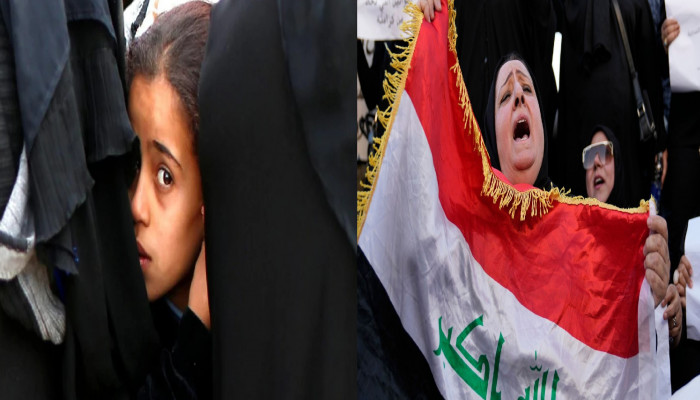Iraq's controversial law allowing child marriage at 9 sparks fiery protests
- In Reports
- 05:13 PM, Nov 11, 2024
- Myind Staff
Iraq is considering a major change to its laws that could lower the legal age for marriage from 18 to 9, allowing men to marry young girls. This proposed change to the 'personal status law,' which was first introduced in 1959 and was once seen as progressive, has sparked strong global criticism.
The new law could take away important rights for Iraqi women, such as divorce, child custody, and inheritance. The Iraqi Parliament, mostly made up of conservative Shia Muslim parties, is preparing to vote on this change. The amendment seeks to take away women's rights to divorce, inheritance, and child custody, following a strict interpretation of Islamic law. Supporters believe this will protect young girls from "immoral relationships." However, critics argue that it could legalise child marriages, putting young girls at greater risk of abuse and depriving them of education and job opportunities.
Iraq’s ruling Shia coalition has previously attempted to amend the personal status law, facing opposition in 2014 and 2017 from women’s rights advocates. But now, with a stronger majority, the coalition is closer than ever to passing these changes, says Renad Mansour, a senior research fellow at Chatham House. “It’s the closest it’s ever been,” Mansour told The Telegraph. He highlighted that a core group within the Shia parties is pushing this amendment to “consolidate their power” and regain ideological legitimacy. “Stressing the religious side is a way for them to try and regain some of the ideological legitimacy that has been waning over the last few years,” he said.
The proposed amendment might be put to a vote at any time, which worries Iraqis and human rights advocates who believe it would directly violate women's rights and move toward theocratic rule. For Iraqi women and activists, the amendment jeopardises decades of progress. “The amendment would not just undermine these rights,” said Sarah Sanbar, Iraq researcher at Human Rights Watch. “It would erase them.” The director of Model Iraqi Woman and an international human rights expert, Athraa Al-Hassan, voiced worries that Iraq would be embracing a form of government akin to the Islamic dictatorship seen in Afghanistan and Iran.
“This is very dangerous,” Al-Hassan said, adding that judiciary interference would violate Iraq’s constitution. “Iraq is a civilised civil state that cannot be otherwise. The first female minister in the Arab countries was Iraqi, and the first female judge was Iraqi. We aspire to progress, not regress,” she added. Iraq already has high rates of child marriage, with about 28% of women married before the age of 18, according to UNICEF. A gap in the current law allows religious leaders to perform marriages for underage girls, which is common in poor Shia communities. These marriages often aren't officially registered, leaving girls and their children without basic rights and protection.
An amendment to the law could make these marriages legal, putting young girls at greater risk of sexual violence and denying them essential rights. Human Rights Watch warns that this could trap many women in poverty and abusive situations with no legal way out. Iraq's Parliament has recently passed laws that restrict women's rights. In April, they made same-sex relationships illegal, with penalties of up to 15 years in prison. Last year, the media was ordered to replace the term "homosexuality" with "sexual deviance," and the word "gender" was banned.
A new proposal has caused anger, with activists calling it an effort to "legalize child rape." In August, the Coalition 188, a group of Iraqi women activists, organised protests in Baghdad and other cities to oppose it. Critics contend that amending Law 188 will strengthen religious identities at the price of national unity, perhaps widening Iraq's sectarian divisions. “It would bring everything back to the sect,” Mansour said, adding, “But many Iraqis don’t want to be defined politically by their sect. They want to be defined by their government and their state.”
If the amendments are approved, Muslim citizens would be able to choose between following the current secular family laws or religious laws based on their sect. However, in case of a disagreement, the husband's sect would have more authority. Activists believe this rule could reduce protections for women and harm equality. “This is going to remove a lot of protections for women,” said Sanbar, voicing concern that the amendment could worsen socioeconomic inequalities among women. “It will undermine the principle of equality before the law.”







Comments